I met Engineer Yakiv[1] on board a merchant ship I had joined just south of Sri Lanka in early 2013. I was there to study seafarers’ perceptions of contemporary maritime piracy. Yakiv seemed to live off coffee and, in Captain Michael’s words, he “breathed through a cigarette.” Shortly after I arrived on board, he had agreed to give me a tour of the ship. As we climbed around the various decks, in the accommodation, the engine control room, the engine room and the bridge, the conversation turned to life in Ukraine, and in particular, to corruption and the financial viability of life there. I noted:
We talk about financial need and being away from family – he says that countries like the Philippines and Ukraine have nothing. I compare to the years when [my husband] travelled so much and how we sometimes considered if he needed to take on extra jobs [in order to make ends meet]. Yakiv replies sharply “No! Because you have hope in your country that there is future. That your children will have schooling and healthcare. That the police will come when you call them.
He was right. As a white woman, living in a Nordic country, I did not worry about these things. I took them for granted. Yakiv had a gruff exterior. One of the electricians wanted to high five with him after a meeting. He complied reluctantly. He’s not a high-five kind of guy. Some of the ratings[2] seemed intimidated by him. I was at first, too.
But he thawed. As my time to sign off neared, the captain kept talking about how dangerous descending the pilot ladder was. People fell, hit their head, and drowned. That was it. But Yakiv admonished him: “Stop saying that! You’ll scare her! She won’t sleep tonight!” I was scared and I mentioned it to him again later. He got a twinkle in his eye and drawing out the vowel, teased me: “Are you scaaaared??” Some days later he explained that the captain was afraid, but he assured me:
There’s no reason to be worried. It will be ok. We will turn the ship to protect you from the waves. We will use bow thruster and stern thruster[3] to turn the ship. See, if you look out, the waves are coming from the starboard side, and if you look out the port side, you will see it is calmer. There is no reason to be a-scared.
Later, I was sitting in my cabin writing up notes with the door open. Yakiv popped in again saying, “Everything is going to be ok. Everybody is aware, safety is ok, nothing is going to happen. I just talked to chief officer and it is final – everybody knows what to do.” I thanked him and he barked back, “Sleep well!”
“You will become brilliant”
It was comforting that Yakiv took my worries seriously and made an effort to help me feel confident and safe. And I made it down the pilot ladder safely. Before I signed off, Yakiv agreed that I could visit him later that year in Odesa. I arrived in April:
I got here on Sunday and Yakiv picked me up. He took me to my hotel, then we went for a little walk around the neighborhood, just to give me a sense of where I am. Lots of the stories he told about the area were about poverty, mismanagement and governmental corruption. Then we came back to my hotel and he decided I needed a local phone. He insisted on buying my prepaid sim card. He said he had an extra phone at his place that I could just use. So, we went back to his place and while he set a pot of coffee on the stove, he found the phone and changed the settings from Russian to English.
About a week later, Yakiv and his wife, Galina, invited some of their friends and me back to their place for a mangal – a barbecue. The guests were Konstantin, an old friend and teacher at the Maritime Academy in Odesa, his wife, Ekaterina, who also teaches at the maritime academy and Lyudmila, who works as a crewing agent. We talked about how Odesa had a long history of regional influence due to its position along the Black Sea, and how it had been the site of war and political struggle for centuries. I noted:
We speak about the history of a city with great cosmopolitan history – very heterogeneous. Konstantin told a story about the kids in the yard learning the languages of their playmates: Russian, Ukrainian, Yiddish, Romanian and Polish. There is lots of talk of all the famous people who have been here and the developments in science and art before the Soviet era. Ekaterina joked that if I stay here a while and just breathe the air, I will become brilliant.
But this grand history was punctured by stories of disappointment and frustration as Ekaterina, Yakiv, Galina and Konstantin described their lives in Odesa. Yakiv worked for a well-established shipping company and earned well. His home was not opulent, but it was comfortable and in the city center. While we sat in their yard, he produced massive amounts of meat from the mangal, and as the evening progressed, we drank schnapps and vodka. Konstantin got kind of drunk and he read some of his poems for us. It was awkward but also sweet. His friends know him and love him. They were familiar with the poems.
“We don’t have to whisper, but we saw our parents doing it”
It was a fun get-together, but there was also a sad and urgent feel to it. Together they explained to me how the people in Ukraine had to be
tough, not only the seafarers. Ekaterina said, “This is a place where there is constant struggle”, adding that there were “well-educated people working as ABs” because “they can’t get work in their field”. Imagery of ships, sailing and the sea was pervasive in Odesa. As noted, Odesa had a long history of maritime prominence due to its Black Sea port, but as Yakiv had initially explained to me, struggle was not just a Ukrainian circumstance, but something he recognized from countries that “have nothing”.
Yakiv added to Ekaterina’s explanation: “There is no time that people can remember when there was peace and trustworthy leadership in Ukraine.” He explained, “Even though we know it’s not Soviet times now, we remember and have learned that if something goes wrong, then the people in charge will want to have someone to blame.” Ekaterina responded, “We remember our parents whispering. If you wanted to talk about politics, you had to whisper about it. We don’t have to whisper, but we saw our parents doing it.”
Some days earlier I met Alexander, an officer who had been subjected to an attempted pirate boarding. “I was afraid,” he told me, “that my mother would find out”. As we spoke about the risk of piracy, I asked him why he did not look for a job on land instead. He responded:
What job? The biggest problem in our country is corruption. In Ukraine, corruption starts at low level and goes all the way up. When you know this system, you understand that you can’t live without it. (…) At present, [seafaring] is only way to make money in our country without cheating. If you want to make good money, you have to have good relationship. This is the only way.
This left Ukrainian seafarers – along with Ukrainians in general – alone with their troubles. During Soviet times, trade unions in Ukraine were controlled by the party. Problems were to be handled on your own, I was told. Experience taught them that involving authorities was not a wise strategy. Today, most Ukrainian seafarers are not unionized. Yevgeny, a maritime lawyer put piracy in perspective for me: “For Ukrainians, Somali and Nigerian pirates are no worse than what they’ve seen in their school, their police and their government”. These people were outspoken. There was no “whispering”, as Ekaterina put it. Because of this history, speaking out seemed to carry an existential weight.
The informal party at Yakiv’s went on till late. Yakiv had invited Lyudmila so that she could meet me and decide if she wanted to share her experiences with me. Yakiv was not sure she would be willing to meet with me: “I don’t know if she wants to talk. It may be too painful”, he warned. As the crewing agent, Lyudmila was responsible for Human Resources tasks for the crews her company sent to sea. In 2009, one of these crews was hijacked by Somali pirates and held for ransom. In the crew’s absence, Lyudmila became responsible for fielding questions and demands from the crew’s terrified loved ones in Odesa. The evening was coming to an end and there were hugs and one kiss on the cheek from everyone. As we said goodbye, Lyudmila said she would be willing to meet with me.
“I can stand it”.
Some days later, Yakiv picked me up and we drove towards Lyudmila’s office. We were a bit early, so he took me to his favorite place “Ваш Cад” [pronounced “Vash Cad”], meaning “Your Garden”, which was a garden center with places to sit outside. There was still a chill in the air amongst the budding trees and potted plants for sale as the conversation turned to corruption again. Yakiv told me that the Ukrainian government only wanted to get money out of the seafarer through bribes. He went on: “If they want to change something then they have to change the corruption – but how to do that?” Poland seemed to fare better after the fall of the Soviet Union, he mused. Getting agitated, he asked:
And why? It’s because a Polish electrician said that anyone who had anything to do with Soviet politics would not be allowed to get involved in current Polish politics. They cleansed Polish politics of Soviet influence. They did not do this here. It’s still the same people.
Yakiv was referring to Lech Walesa, a shipyard electrician who was a key player in the establishment of “Solidarity”, the first free trade union in Eastern Europe that grew into a large political movement, ultimately leading to the fall of the Communist party in Poland and the election of the non-communist prime minister – Tadeusz Mazowiecki – in 1989. Yakiv continued, telling me that there was a debate about whether Ukraine should join Russia in some kind of union. He had strong opinions about this idea:
People are always asking about the big existential questions – how should we organize our society? I tell my friends who think this is a good idea that Ukraine never benefitted from being with Russia – also before the Soviet Union. Why should it be better now?
It was getting close to our meeting time with Lyudmila and so we left this bright friendly place and after a short drive, found ourselves in a dimly lit foyer of an office building. It smelled musty and looked more like an old kitchen than the entrance to an office building.
We took the rickety elevator up to Lyudmila’s office, where she re-told her harrowing experiences with the pirated crew, and ordeal that left her sick. But again, amidst this narrative, she reflected more broadly on life in Ukraine:
Ukrainians are brave people. Maybe our life on shore is too hard (…). We don’t go to a psychologist. We go to friends, my husband, take some rest. (…). Maybe we’re not too brave – our lives are too hard here. Seafarers’ job is very risky and hard. There is no work on shore, so they go to sea. It’s a hard life. There are also wage problems, safety. But we have no choice. We accept any conditions.
While Lyudmila was dealing with family members of the kidnapped crew, her son was sailing on a similar vessel near the Somali coast. I imagined that this had surely been very difficult for her. She countered, “He knows me. He knows I can stand it. I shared information with him. He must know because he is a seafarer. I spoke a lot with him, especially about the difficulties.”
This notion of being able to “stand it,” and how this ability was communicated intrigued me. It struck me as a way of practicing care – a mutual agreement among loved ones to perform resilience. We spoke about being parents in Ukraine. Lyudmila laughed “Typical Ukrainian: we scare the children. We tell them to be careful.” She and Yakiv agreed that Ukrainians “watch over our kids like hawks”. She joked that her husband had suggested that they buy a boat to trail their son at sea to be sure he was safe.
Lyudmila had to get back to work. As we got up to leave, she said: “Here in Ukraine, we don’t shake hands. Only if it’s very business-like.” We hugged and kissed each other’s cheeks and she said, “Now you have friends in Ukraine and you can come back”. I wish I could.
“A True Story”
Yakiv and I left the dark office building and found ourselves squinting in the sunlight. He pointed out Lenin Park across the street and told me, his voice dripping with sarcasm, “Now it is called ‘Victory ’.” It seemed to me that Yakiv thought this post-Soviet re-naming was silly. He always insisted on the old names, he told me. It did not seem that he longed for Soviet times, but I got the feeling that the re-naming somehow felt fake to him. It reminded me of George Orwell’s fictional book 1984 in which words were changed to convolute their meaning for the purpose of indoctrination and suppression, such as Orwell’s “newspeak” term “joycamp” instead of “forced-labour camp”. Yakiv got excited, “Of course I’ve read it!” It was banned before the fall of the Soviet Union, but, with that same mischievous look when he teased me at sea, he confessed that he and his friends got their hands on illegal copies. Yakiv explained that George Orwell was actually telling a true story. “This is what life was like – not the main character, where terrible things happen – but everything else around him.” As we crossed the street, on our way back to where his car was parked, Yakiv held out a protective arm, “You don’t trust the light here – you have to look each way all the time!”
My time in Odesa was coming to an end. Yakiv brought me to the airport. He insisted on carrying my suitcase and asked if my husband was
Yakiv and I have stayed in contact over the years. At the end of 2013, he sent me photographs of himself at a EuroMaidan demonstration in Kyiv against the then president, pro-Russian Viktor Yanukovych. Yanukovych had refused to sign an agreement to establish closer political and economic ties between Ukraine and the EU, although Parliament had agreed to move forward with agreement. The protests against his refusal grew into a broader social movement that addressed the kinds of injustices that Yakiv and others from Odesa shared with me: corruption, violence, lack of security and a rhetoric that was reminiscent of Orwell’s newspeak. The popular outcry resulted in violent backlash and Yanukovych and his party members eventually fled Ukraine for Russia. The Parliament installed an interim government. In early 2014, Russian troops annexed Crimea and fighting in eastern Ukraine regions of Luhansk and Donetsk broke out. I wrote Yakiv again and asked if he felt safe – Odesa was not far from Crimea and was a major international shipping hub. He said that they were not worried. They spent some time at their dacha (land house), outside of the city. There were traffic problems to get his wife into the city where she worked, but otherwise it was fine. Was it fine, I wondered? Or was he telling me he could stand it?
Yakiv is not sailing anymore, but we continue to communicate sporadically. Russian troops began to assemble along Ukraine’s border in November 2021, and in February this year, I reached out again to hear if Yakiv was safe. He responded:
All OK in Odesa, me and my family. Ukraine is strong and we will crash Russia with help from around the world [and] people like you. Hope Ukraine will join EU soon do what ever from your side [to] help Ukraine on this way. (…) Me and my son Boris almost all the time my land house 50 km outside Odesa. Galina needs to stay home since she is responsible person at hospital.
Adrienne: Great to hear from you, Yakiv. I agree with everything you write. If you need anything, feel free to text or call me. (…) We have a guest room in our apartment in Copenhagen. Stay safe and strong in Odesa and at your dacha. All of Europe is behind you. Warm regards, Adrienne
Yakiv: Hi Adrienne Many thanks for your care, situation here becomes more severe problem is that my son Boris has no external passport I will investigate how to arrange Thanks for your offer meanwhile my nephew Swiss citizen and my cousin Spain citizen. This is a matter to take dicision for me but its not so easy to leave present life Keep u update BR Yakiv
Adrienne: Do please keep me updated. I don’t think, given the situation that he will need a passport[4]. Just his ID card. The trains from Poland, Germany and Denmark – and other European countries – are free if you come from the Ukraine. I cannot imagine how hard the decision is. My offer stands: let me know if you need a place to stay, even for a short time. Best, Adrienne
Yakiv: Thanks Adrienne for the moment stay in Ukraine
Adrienne: Stay safe. Greetings to Galina.
Yakiv: thanks Adrienne !
After Russian troops invaded Ukraine and began bombing civilian targets, I revisited my fieldnotes from 2013. They struck me as visceral explanations for the Ukrainians’ current determination – often packaged in dark humor – of their tired familiarity with abuse and unflinching insistence on protecting what they hold dear. I wish there was something I could do to help Yakiv. A poor substitute is this contribution that I hope can somehow speak to the current and past misery with respect and care for the generous and tough people who opened their homes and hearts to me. Yakiv’s last message was sent on March 3rd. I wrote a week later, “Thinking of you, your family and friends and beautiful Odesa.” I have not heard back from him.
Endnotes
[1] All names, other than public figures, have been changed to protect identity.
[2] A “rating” is a non-officer position on board, sometimes referred to as “AB” (able-bodied seaman) or “OS” (ordinary seaman).
[3] The bow (front) and stern (back) thrusters enable a ship to maneuver more precisely. They are often used for docking. Yakiv was planning on careful maneuvering for my sake.
[4] Shortly after we wrote, the Ukrainian government restricted men of fighting age from leaving the country.
Featured image by author



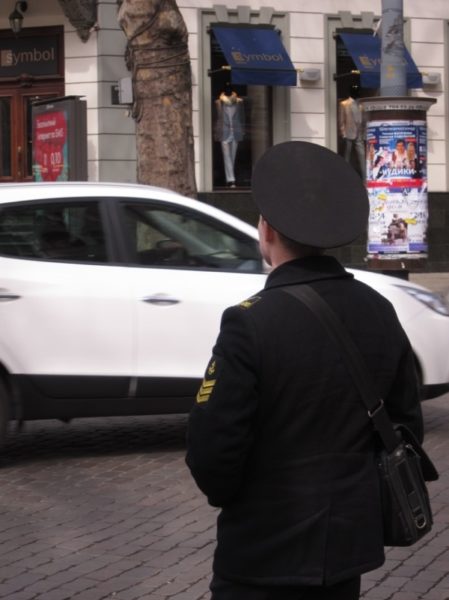

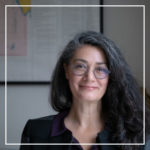

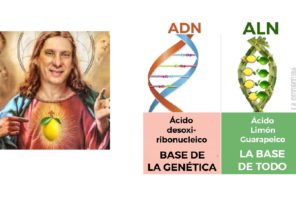
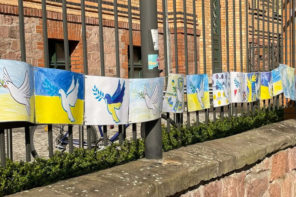
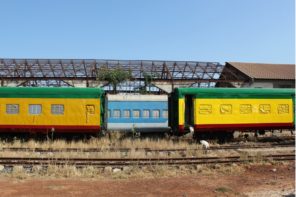
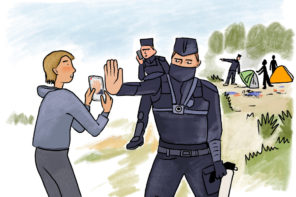
Yakiv and his son are in safety outside of Ukraine.